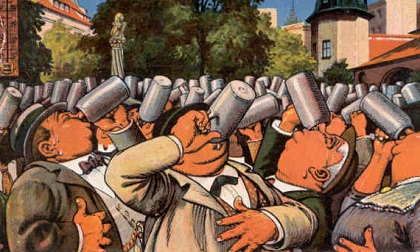
It was nearly one hundred years between the time philosopher Henry Finck proposed humans literally have a “second way of smelling” and University of Pennsylvania psychologist Paul Rozin established the role of retronasal smell in perception of flavor.
In 1886, Finck suggested that smell was responsible for at least two-thirds of gastronomic enjoyment. In an essay titled “The Gastronomic Value of Odours” he began: “Amusing experiments may be made showing that without this sense (smell) it is commonly quite impossible to distinguish between different articles of food and drink. Blindfold a person and make him clasp his nose tightly, then put into his mouth successively small pieces of beef, mutton, veal, and pork, and it is safe to predict that he will not be able to tell one morsel from another. The same results will be obtained with chicken, turkey, and duck; with pieces of almond, walnut, hazelnut . . .”
This parlor trick may also be attempted with beer. Much of what we call the flavor of beer — particularly hop flavor — seems to be happening in the mouth, but really our olfactory system is responsible.
Further in his essay Finck turns to the topic of beer. Perhaps it will help you in studying for the Cicerone exam.
Tea and coffee might be called feminine beverages, inasmuch as the fair sex seem on the whole to be more addicted to their use than men. But for the drink next on our list the female population of most countries does not show such a decided appreciation. The reason commonly given by ladies why they do not like beer is that it is “so bitter;” but the real reason is that women are rarely enabled to drink beer under favourable circumstance. The essense of beer lies in its aromatic gas. If that is allowed to escape the beer tastes stale, flat, and bitter, and gives rise to headaches and indigestion; whereas, with the gas, it is palatable, wholesome, and an aid to digestion. To get it in this state it must be taken from a keg freshly tapped and runk on the spot without much delay; and since women of the higher classes in this country (the United States) do not frequent localities where beer is kept on tap, they never have an opportunity to find out how good beer really “tastes,” for bottled beer consumed at home is always vastly inferior to keg beer. In Munich, however, which is the paradise of beer-drinkers, women are fond of beer as the men, because it is considered perfectly proper for the best families to visit the festively illuminated beer-gardens in the evening.
In Munich, too, every mug and glass has a lid to prevent the gas from escaping too rapidly. This gas must not be confounded with the artificial foam which dishonest bar tenders produce in a glass by holding it far below the faucet, a practice which not only compels the gues to pay for half a glass of empty foam, but which allows the real gas to escape prematurely. Every beer glass in Munich has a mark up to which the liquid must reach by a legal enactment, consequently little or no foam is dished up with beer, and the brewers admit that the best beer has no foam on top. Waiters, in pour out bottled beer invariably make the mistake of holding up the bottle as high as possible so as to get a foam.
From wine and most other drinks beer differs in this, that it must be swallowed in large doses to be full appreciated. The most confirmed beer-drinker is overcome with nausea if he attempts to empty a glass with a spoon; and under no circumstances should a glass serve more than three or four swallows. The greatest amount of bliss is apparently vouchsafed to those who can gulp down a whole pint at ounce. Such magicians are as common as blackberries in Germany; and they often give vent to their satisfaction by a sort of gastronomic grunt — a prolonged ääh! A Munich Fliegende Blätter once had a picture of an artist sitting in front of a country tavern drinking beer. The host watches him with a look of dissatisfaction, and finally asks: “Don’t you like my beer” “Certainly, replied the arits; “it is very good.” “Why then,” retorted the host, “don you say ääh! when you finish a glass.”
Drink up.
“…and under no circumstances should a glass serve more than three or four swallows.”
Yikes? As someone who has enjoyed beer in Bavaria (and responded with the requisite Aaaahhh – probably sans umlauts), I don’t think I’d ever attempt a Maß in 3 or 4 swallows!
On the other hand, and more to the subject, I sure did enjoy putting my pan into the mouth of those Maß and deep-breathing the delicious goodness of those malts and hops.